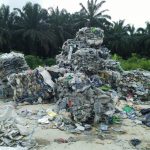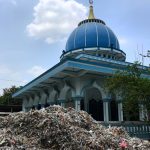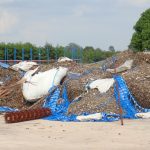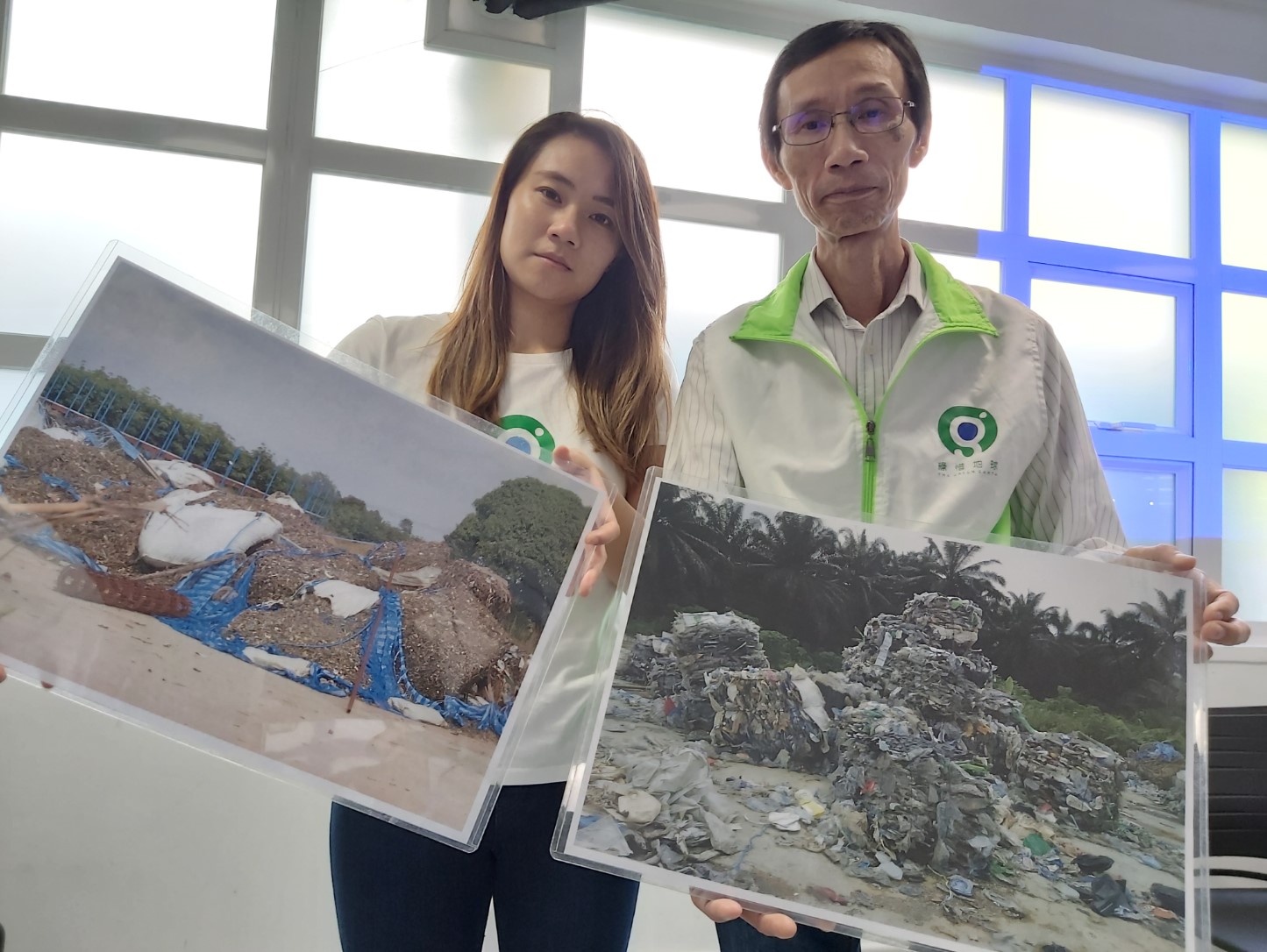
On the Right:Edwin Lau, Executive Director of The Green Earth; On the Left:Kylie Yeung, Researcher
(11 Nov 2019 Press Release) Hong Kong is a free port not only for goods, but also garbage. An investigation by The Green Earth (TGE) ranked Hong Kong as the second biggest and third biggest provider of waste plastics for Thailand and the Philippines for the first nine months and seven months of 2019 respectively. In recent months, Southeast Asian countries returned hundreds of problematic containers of garbage to their senders, including Hong Kong.
The three countries proclaiming to return containers to Hong Kong include the Philippines, Malaysia and Indonesia. TGE explained, “Plastic money coursed through happy-go-lucky Hong Kong in the form of copious amount of plastic waste destined for developing countries.” Plastics declared to be recyclables often contain garbage such as broken printed circuit boards, diapers and food waste.
TGE warns, “The trade on hazardous and household waste is regulated by the Basel Convention [1] which was amended in May 2019. The amendments would enter into force in 2021 when the consent of importing countries is required for the export of mixed, unrecyclable and contaminated plastic waste. If Hong Kong doesn’t beef up its regulations and inspections soon, the world’s garbage free port is likely to become the world’s junkyard.”
Many of the developed countries provide subsidies for export of untreated waste to save costs on waste treatment, and as a result, vigorous trade of plastic waste has become a profitable business in Hong Kong. In 2018, Hong Kong’s re-export of waste plastics maintained at about 280,000 tonnes a year, worth HK$727 million, despite a big drop of 83.4% in re-export volume following China’s import ban of foreign waste since 2017. [2] According to the trade statistics from the Census and Statistics Department, in 2018, nearly 80% of the aforesaid 280,000 tonnes waste plastics were re-exported via Hong Kong to Southeast Asian countries such as Thailand, Malaysia, Vietnam, the Philippines and Indonesia.
We compiled a list of senders from which Southeast Asian countries received plastic waste and discovered that Hong Kong was among the top-ranking senders of at least Thailand, Malaysia and the Philippines. Hong Kong remained the first runner-up for Thailand when the country imported from Hong Kong almost 30% of its waste plastics by quantity for the first nine months of 2019.

“Waste Plastics are classified following an 8-digit Harmonized System (HS) code for declaration. The commodity code for waste plastics starts with HS 3915. The remaining four digits indicate various types of plastics waste,” said Yuyun Ismawati from Nexus3, an Indonesian green activist with expertise on waste trade and health. “You should watch out for HS 39159090, which is cheap plastic scraps and highly mixed. Nobody wants these plastics, even in the countries where they came from.”
TGE does not intend to tar all plastic scraps and parings with the same brush as waste. However, an analysis of the 2016 to 2018 statistics available from the Census and Statistics Department reveals that HS 39159090 took up an average of 65.5% in the said three years, and the percentage reached 70% for 2018. [4]
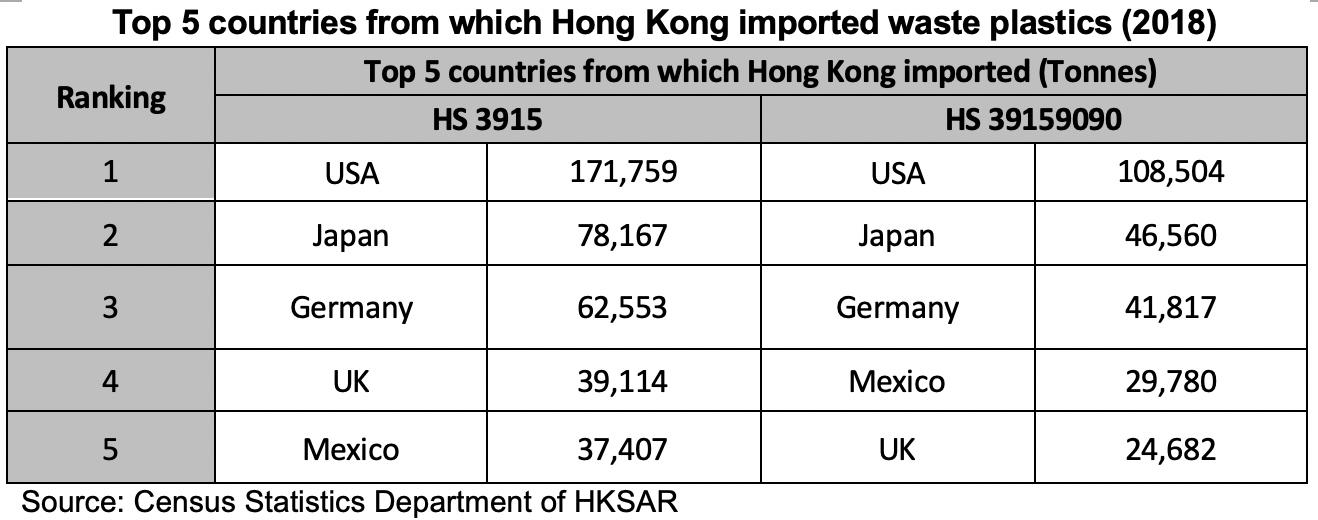
Why do developed countries re-export waste plastics through Hong Kong? TGE said, “Risk management contributes to making Hong Kong an important hub of plastic waste trade.”
Plastic waste traders establish Hong Kong companies to re-export plastic waste to developing countries. In case cargos are rejected by destination countries, shipment to Hong Kong is much cheaper than making all the way back to Europe or North America. Moreover, if waste exporters have been subsidized to export plastic waste, the relevant authority naturally would not accept any return. It would be more economical for these waste exporters to look for new destinations in proximity to Hong Kong, especially with the help of abundant waste trade brokers.
According to the Basel Action Network (BAN), an international waste trade watchdog organization, Hong Kong is failing to fulfill their international legal obligations as a transit and possibly, exporting city. Hong Kong is legally obliged to require that all waste shipments that come off the boat in Hong Kong are disallowed unless they have received the consent of Hong Kong authorities for transit through Hong Kong. And if Hong Kong ships opened containers onward, they must notify and receive consent from the importing country.
“Once a victim of rich developed countries dumping wastes on the New Territories area, now Hong Kong is doing the same to South East Asia. They must vigorously enforce the Basel Convention rules and prosecute their waste traders, ”said BAN director Jim Puckett.
Prosecutions by the Environmental Protection Department (EPD) and the Customs and Excise Department on illegal import and export of waste increased in recent years (See Table). Despite so, given the high trade volume of plastic waste as aforesaid, TGE urges the government: 1) to strengthen its information gathering and law enforcement; 2) to pay specific attention to and have more inspections of HS 39159090 cargos; 3) to tighten its regulations of shipping documents. And in the event of problematic cargo returns, more stringent and frequent inspection of the relevant shipping companies should be in place.

Click here for the Press Conference Presentation Slides
Press Enquiry:
Researcher: Kylie Yeung / Director of Environmental Advocacy: Hahn Chu / Executive Director: Edwin Lau
Tel: 3708 8380
Foot Notes:
1. The Basel Convention on the Control of Transboundary Movements of Hazardous Wastes and Their Disposal
2. Source: Trade statistics from the Census and Statistics Department
3. Source: Information and Communication Technology Center with the Cooperation of the Customs Department, Thailand
4. Source: The Census and Statistics Department
Thank you to the following organizations for providing support to this investigation:
Basel Action Network, Consumers’ Association of Penang, Ecological Alert and Recovery – Thailand (EARTH), Nexus3 Foundation, Story of Plastic
Is Hong Kong contributing to Southeast Asian Plastic Waste?
(Click Photos to Enlarge)

